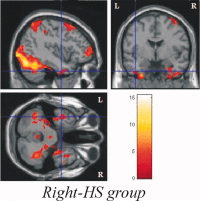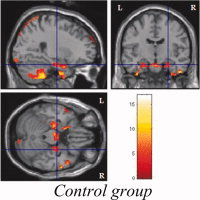Brain plasticity for verbal and visual memories in patients with mesial temporal lobe epilepsy and hippocampal sclerosis: an fMRI study
- PMID: 22038783
- PMCID: PMC6870348
- DOI: 10.1002/hbm.21432
Brain plasticity for verbal and visual memories in patients with mesial temporal lobe epilepsy and hippocampal sclerosis: an fMRI study
Abstract
We aimed to identify the brain areas involved in verbal and visual memory processing in normal controls and patients with unilateral mesial temporal lobe epilepsy (MTLE) associated with unilateral hippocampal sclerosis (HS) by means of functional magnetic resonance imaging (fMRI). The sample comprised nine normal controls, eight patients with right MTLE, and nine patients with left MTLE. All subjects underwent fMRI with verbal and visual memory paradigms, consisting of encoding and immediate recall of 17 abstract words and 17 abstract drawings. A complex network including parietal, temporal, and frontal cortices seems to be involved in verbal memory encoding and retrieval in normal controls. Although similar areas of activation were identified in both patient groups, the extension of such activations was larger in the left-HS group. Patients with left HS also tended to exhibit more bilateral or right lateralized encoding related activations. This finding suggests a functional reorganization of verbal memory processing areas in these patients due to the failure of left MTL system. As regards visual memory encoding and retrieval, our findings support the hypothesis of a more diffuse and bilateral representation of this cognitive function in the brain. Compared to normal controls, encoding in the left-HS group recruited more widespread cortical areas, which were even more widespread in the right-HS group probably to compensate for their right mesial temporal dysfunction. In contrast, the right-HS group exhibited fewer activated areas during immediate recall than the other two groups, probably related to their greater difficulty in dealing with visual memory content.
Copyright © 2011 Wiley Periodicals, Inc.
Figures










References
-
- Aldenkamp AP, Boon PA, Deblaere K, Achten E, Backes WH, Boon P, Hofman P, Troost J, Vandemaele P, Vermeulen J, Vonck K, Wilmink J ( 2003): Usefulness of language and memory testing during intracarotid amobarbital testing: Observations from an fMRI study. Acta Neurol Scand 108: 147–152. - PubMed
-
- Alessio A, Kobayashi E, Damasceno BP, Lopes‐Cendes I, Cendes F ( 2004a): Evidence of memory impairment in asymptomatic individuals with hippocampal atrophy. Epilepsy Behav 5: 981–987. - PubMed
-
- Alessio A, Damasceno BP, Camargo CHP, Kobayashi E, Guerreiro CAM, Cendes F ( 2004b): Differences in memory performance and other clinical characteristics in patients with mesial temporal lobe epilepsy with and without hippocampal atrophy. Epilepsy Behav 5: 22–27. - PubMed
-
- Alessio A, Bonilha L, Rorden C, Kobayashi E, Li ML, Damasceno BP, Cendes F ( 2006): Memory and language impairments and their relationship to hippocampal and perirhinal cortex damage in patients with medial temporal lobe epilepsy. Epilepsy Behav 8: 593–600. - PubMed
-
- Baxendale SA ( 1997): The role of the hippocampus in recognition memory. Neuropsychologia 35: 591–598. - PubMed
Publication types
MeSH terms
LinkOut - more resources
Full Text Sources
Medical
Research Materials

